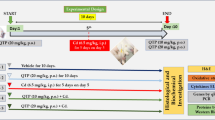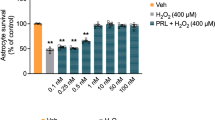Abstract
In recent years, orexin (ORX) and melanin-concentrating hormone (MCH) have been demonstrated to exert neuroprotective roles in cerebral ischemia. Hence, this study investigated the regulatory function of ORX and MCH in neurological function following ischemic stroke and explored the molecular mechanism underlying these functions. A rat model of ischemic stroke was developed by middle cerebral artery occlusion (MCAO), and Longa scoring was employed to evaluate the degree of neurological function deficit. The expression patterns of ORX and MCH were examined by real-time polymerase chain reaction in the brain tissues of rats with ischemic stroke induced by middle cerebral artery occlusion (MCAO). Moreover, electroencephalography (EEG) analysis and high-performance liquid chromatography (HPLC) were respectively performed to detect rapid-eye movement (REM) sleep, the glutamate (Glu) uptake, and the expression of γ-aminobutyric acid B receptor (GABAB). Immunoblotting was performed to test the levels of autophagic markers LC3, BECLIN-1, and p62. Immunohistochemistry (IHC) staining and TUNEL assays were respectively used to assess the autophagy and neuronal apoptosis. Results demonstrated that ORX and MCH were lowly expressed in brain of rats with ischemic stroke. ORX or MCH overexpression decreased neuronal apoptosis and autophagy, and improved the sleep architecture of post-stroke rats, while rescuing Glu uptake and GABA expression. ORX or MCH upregulation exerted protective effects on neurological function. Taken together, ORX and/or MCH protect against ischemic stroke in a rat model, highlighting their value as targets for the clinical treatment of ischemic stroke.




Similar content being viewed by others
Availability of Data and Material
The datasets generated/analyzed during the current study are available.
Abbreviations
- ORX:
-
Orexin
- MCH:
-
Melanin concentrating hormone
- MCAO:
-
Middle cerebral artery occlusion
- EEG:
-
Electroencephalography
- HPLC:
-
High-performance liquid chromatography
- REM:
-
Rapid-eye movement
- Glu:
-
Glutamate
- GABAB :
-
γ-Aminobutyric acid B receptor
- IHC:
-
Immunohistochemistry
- p62:
-
Protein sequestosome 1/p62
- oe:
-
Overexpression
- Tturn :
-
Time taken by the rats to orient themselves 180° head-downwards
- Ttotal :
-
Time taken to place all four paws on the ground reached the ground
- TUNEL:
-
Terminal deoxynucleotidyl transferase-mediated dUTP-biotin nick end labeling
- DAPI:
-
6-Diamidino-2-phenylindole
- TTC:
-
2, 3, 5-Triphenyltetrazolium chloride
- OPA:
-
O-phthalaldehyde
- RT-qPCR:
-
Reverse transcription quantitative polymerase chain reaction
- SDS:
-
Sodium dodecyl sulfate
- OX1R:
-
Orexin-1-receptor
- OX2R:
-
Orexin-2-receptor
- TBST:
-
Tris-buffered saline Tween
- ANOVA:
-
Analysis of variance
References
Clark IA, Vissel B (2014) Inflammation-sleep interface in brain disease: TNF, insulin, orexin. J Neuroinflammation 11:51. https://doi.org/10.1186/1742-2094-11-51
Denk H, Stumptner C, Abuja PM, Zatloukal K (2019) Sequestosome 1/p62-related pathways as therapeutic targets in hepatocellular carcinoma. Expert Opin Ther Targets 23(5):393–406. https://doi.org/10.1080/14728222.2019.1601703
Flores A, Saravia R, Maldonado R, Berrendero F (2015) Orexins and fear: implications for the treatment of anxiety disorders. Trends Neurosci 38(9):550–559. https://doi.org/10.1016/j.tins.2015.06.005
Gonzalez JA, Iordanidou P, Strom M, Adamantidis A, Burdakov D (2016) Awake dynamics and brain-wide direct inputs of hypothalamic MCH and orexin networks. Nat Commun 7:11395. https://doi.org/10.1038/ncomms11395
Harada S, Yamazaki Y, Tokuyama S (2013) Orexin-A suppresses postischemic glucose intolerance and neuronal damage through hypothalamic brain-derived neurotrophic factor. J Pharmacol Exp Ther 344(1):276–285. https://doi.org/10.1124/jpet.112.199604
Henny P, Brischoux F, Mainville L, Stroh T, Jones BE (2010) Immunohistochemical evidence for synaptic release of glutamate from orexin terminals in the locus coeruleus. Neuroscience 169(3):1150–1157. https://doi.org/10.1016/j.neuroscience.2010.06.003
Huang L, Li Q, Wen R, Yu Z, Li N, Ma L, Feng W (2017) Rho-kinase inhibitor prevents acute injury against transient focal cerebral ischemia by enhancing the expression and function of GABA receptors in rats. Eur J Pharmacol 797:134–142. https://doi.org/10.1016/j.ejphar.2017.01.021
Jego S, Glasgow SD, Herrera CG, Ekstrand M, Reed SJ, Boyce R, Friedman J, Burdakov D, Adamantidis AR (2013) Optogenetic identification of a rapid eye movement sleep modulatory circuit in the hypothalamus. Nat Neurosci 16(11):1637–1643. https://doi.org/10.1038/nn.3522
Jiang Y, Yang S, Tao J, Lin Z, Ye X, You Y, Peng J, Hong Z, Chen L (2016) Opposing needling promotes behavior recovery and exerts neuroprotection via the cAMP/PKA/CREB signal transduction pathway in transient MCAO rats. Mol Med Rep 13(3):2060–2070. https://doi.org/10.3892/mmr.2016.4773
Jin R, Xiao AY, Chen R, Granger DN, Li G (2017) Inhibition of CD147 (cluster of differentiation 147) ameliorates acute ischemic stroke in mice by reducing thromboinflammation. Stroke 48(12):3356–3365. https://doi.org/10.1161/STROKEAHA.117.018839
Johnston SC, Easton JD, Farrant M, Barsan W, Conwit RA, Elm JJ, Kim AS, Lindblad AS, Palesch YY, Clinical Research Collaboration NETTN, the PI (2018) Clopidogrel and aspirin in acute ischemic stroke and high-risk TIA. N Engl J Med 379(3):215–225. https://doi.org/10.1056/NEJMoa1800410
Khandelwal P, Yavagal DR, Sacco RL (2016) Acute ischemic stroke intervention. J Am Coll Cardiol 67(22):2631–2644. https://doi.org/10.1016/j.jacc.2016.03.555
Kim S, Jo K, Hong KB, Han SH, Suh HJ (2019) GABA and l-theanine mixture decreases sleep latency and improves NREM sleep. Pharm Biol 57(1):65–73. https://doi.org/10.1080/13880209.2018.1557698
Li A, Zhang H, Han H, Zhang W, Yang S, Huang Z, Tan J, Yi B (2019) LC3 promotes the nuclear translocation of the vitamin D receptor and decreases fibrogenic gene expression in proximal renal tubules. Metabolism 98:95–103. https://doi.org/10.1016/j.metabol.2019.06.008
Magi S, Piccirillo S, Amoroso S (2019) The dual face of glutamate: from a neurotoxin to a potential survival factor-metabolic implications in health and disease. Cell Mol Life Sci 76(8):1473–1488. https://doi.org/10.1007/s00018-018-3002-x
Mahler SV, Moorman DE, Smith RJ, James MH, Aston-Jones G (2014) Motivational activation: a unifying hypothesis of orexin/hypocretin function. Nat Neurosci 17(10):1298–1303. https://doi.org/10.1038/nn.3810
Matsuura K, Kabuto H, Makino H, Ogawa N (1997) Pole test is a useful method for evaluating the mouse movement disorder caused by striatal dopamine depletion. J Neurosci Methods 73(1):45–48. https://doi.org/10.1016/s0165-0270(96)02211-x
Mickelsen LE, Kolling FWt, Chimileski BR, Fujita A, Norris C, Chen K, Nelson CE, Jackson AC (2017) Neurochemical heterogeneity among lateral hypothalamic hypocretin/orexin and melanin-concentrating hormone neurons identified through single-cell gene expression analysis. eNeuro 4(5):https://doi.org/10.1523/ENEURO.0013-17.2017
Noble EE, Hahn JD, Konanur VR, Hsu TM, Page SJ, Cortella AM, Liu CM, Song MY, Suarez AN, Szujewski CC, Rider D, Clarke JE, Darvas M, Appleyard SM, Kanoski SE (2018) Control of feeding behavior by cerebral ventricular volume transmission of melanin-concentrating hormone. Cell Metab 28(1):55–68 e57. https://doi.org/10.1016/j.cmet.2018.05.001
Pace M, Adamantidis A, Facchin L, Bassetti C (2017) Role of REM sleep, melanin concentrating hormone and orexin/hypocretin systems in the sleep deprivation pre-ischemia. PLoS ONE 12(1):e0168430. https://doi.org/10.1371/journal.pone.0168430
Sanchart C, Rattanaporn O, Haltrich D, Phukpattaranont P, Maneerat S (2017) Enhancement of gamma-aminobutyric acid (GABA) levels using an autochthonous Lactobacillus futsaii CS3 as starter culture in Thai fermented shrimp (Kung-Som). World J Microbiol Biotechnol 33(8):152. https://doi.org/10.1007/s11274-017-2317-3
Schneeberger M, Tan K, Nectow AR, Parolari L, Caglar C, Azevedo E, Li Z, Domingos A, Friedman JM (2018) Functional analysis reveals differential effects of glutamate and MCH neuropeptide in MCH neurons. Mol Metab 13:83–89. https://doi.org/10.1016/j.molmet.2018.05.001
Seifinejad A, Li S, Mikhail C, Vassalli A, Pradervand S, Arribat Y, Pezeshgi Modarres H, Allen B, John RM, Amati F, Tafti M (2019) Molecular codes and in vitro generation of hypocretin and melanin concentrating hormone neurons. Proc Natl Acad Sci USA 116(34):17061–17070. https://doi.org/10.1073/pnas.1902148116
She Y, Shao L, Zhang Y, Hao Y, Cai Y, Cheng Z, Deng C, Liu X (2019) Neuroprotective effect of glycosides in Buyang Huanwu Decoction on pyroptosis following cerebral ischemia-reperfusion injury in rats. J Ethnopharmacol 242:112051. https://doi.org/10.1016/j.jep.2019.112051
Song T, Su H, Yin W, Wang L, Huang R (2019) Acetylation modulates LC3 stability and cargo recognition. FEBS Lett 593(4):414–422. https://doi.org/10.1002/1873-3468.13327
Tong LS, Guo ZN, Ou YB, Yu YN, Zhang XC, Tang J, Zhang JH, Lou M (2018) Cerebral venous collaterals: a new fort for fighting ischemic stroke? Prog Neurobiol 163–164(172–193. https://doi.org/10.1016/j.pneurobio.2017.11.001
Toossi H, Del Cid-Pellitero E, Jones BE (2016) GABA receptors on orexin and melanin-concentrating hormone neurons are differentially homeostatically regulated following sleep deprivation. eNeuro 3(3):https://doi.org/10.1523/ENEURO.0077-16.2016
Vakili A, Einali MR, Bandegi AR (2014) Protective effect of crocin against cerebral ischemia in a dose-dependent manner in a rat model of ischemic stroke. J Stroke Cerebrovasc Dis 23(1):106–113. https://doi.org/10.1016/j.jstrokecerebrovasdis.2012.10.008
Wang SL, Duan L, Xia B, Liu Z, Wang Y, Wang GM (2017) Dexmedetomidine preconditioning plays a neuroprotective role and suppresses TLR4/NF-kappaB pathways model of cerebral ischemia reperfusion. Biomed Pharmacother 93:1337–1342. https://doi.org/10.1016/j.biopha.2017.06.051
Wang Y, Ren Q, Zhang X, Lu H, Chen J (2018) Neuroprotective mechanisms of calycosin against focal cerebral ischemia and reperfusion injury in rats. Cell Physiol Biochem 45(2):537–546. https://doi.org/10.1159/000487031
Xingyong C, Xicui S, Huanxing S, Jingsong O, Yi H, Xu Z, Ruxun H, Zhong P (2013) Upregulation of myeloid cell leukemia-1 potentially modulates beclin-1-dependent autophagy in ischemic stroke in rats. BMC Neurosci 14:56. https://doi.org/10.1186/1471-2202-14-56
Xiong X, White RE, Xu L, Yang L, Sun X, Zou B, Pascual C, Sakurai T, Giffard RG, Xie XS (2013) Mitigation of murine focal cerebral ischemia by the hypocretin/orexin system is associated with reduced inflammation. Stroke 44(3):764–770. https://doi.org/10.1161/STROKEAHA.112.681700
Yan H, Yuan J, Gao L, Rao J, Hu J (2016) Long noncoding RNA MEG3 activation of p53 mediates ischemic neuronal death in stroke. Neuroscience 337:191–199. https://doi.org/10.1016/j.neuroscience.2016.09.017
Yang J, Chen M, Cao RY, Li Q, Zhu F (2018a) The role of circular RNAs in cerebral ischemic diseases: ischemic stroke and cerebral ischemia/reperfusion injury. Adv Exp Med Biol 1087:309–325. https://doi.org/10.1007/978-981-13-1426-1_25
Yang W, Liu C, Xu Q, Qu C, Sun J, Huang S, Kong N, Lv X, Liu Z, Wang L, Song L (2019) Beclin-1 is involved in the regulation of antimicrobial peptides expression in Chinese mitten crab Eriocheir sinensis. Fish Shellfish Immunol 89:207–216. https://doi.org/10.1016/j.fsi.2019.03.065
Yang Y, Yang J, Zhang H, Mo C, Zhou T, Tan W (2018b) The investigation of protective effects of isosteviol sodium on cerebral ischemia by metabolomics approach using ultra-high-performance liquid chromatography coupled with quadrupole time-of-flight tandem mass spectrometry. Biomed Chromatogr 32(12):e4350. https://doi.org/10.1002/bmc.4350
Yoshida T, Terabe T, Nagai H, Uchida F, Hasegawa S, Nagao T, Miyabe S, Ishibashi-Kanno N, Yamagata K, Warabi E, Gosho M, Yanagawa T, Bukawa H (2019) Association between p62 expression and clinicopathological characteristics in oral leukoplakia. Clin Exp Dent Res 5(4):389–397. https://doi.org/10.1002/cre2.193
Yu P, Wang L, Tang F, Zeng L, Zhou L, Song X, Jia W, Chen J, Yang Q (2017) Resveratrol pretreatment decreases ischemic injury and improves neurological function via sonic Hedgehog signaling after stroke in rats. Mol Neurobiol 54(1):212–226. https://doi.org/10.1007/s12035-015-9639-7
Yuan LB, Dong HL, Zhang HP, Zhao RN, Gong G, Chen XM, Zhang LN, Xiong L (2011) Neuroprotective effect of orexin-A is mediated by an increase of hypoxia-inducible factor-1 activity in rat. Anesthesiology 114(2):340–354. https://doi.org/10.1097/ALN.0b013e318206ff6f
Zhao LR, Willing A (2018) Enhancing endogenous capacity to repair a stroke-damaged brain: an evolving field for stroke research. Prog Neurobiol 163–164:5–26. https://doi.org/10.1016/j.pneurobio.2018.01.004
Zhu F, Feng M, Sinha R, Murphy MP, Luo F, Kao KS, Szade K, Seita J, Weissman IL (2019a) The GABA receptor GABRR1 is expressed on and functional in hematopoietic stem cells and megakaryocyte progenitors. Proc Natl Acad Sci U S A 116(37):18416–18422. https://doi.org/10.1073/pnas.1906251116
Zhu Z, Shi Z, Xie C, Gong W, Hu Z, Peng Y (2019b) A novel mechanism of Gamma-aminobutyric acid (GABA) protecting human umbilical vein endothelial cells (HUVECs) against H2O2-induced oxidative injury. Comp Biochem Physiol C Toxicol Pharmacol 217:68–75. https://doi.org/10.1016/j.cbpc.2018.11.018
Funding
This study was supported by the Fundamental Research Funds for the Central Universities (No. 012019121); Xi’an Social Development Guidance Plan Medical Research Project (No. 2017115SF/YX009); and Natural Science Foundation of Shaanxi Province (2021JM-567; 2021JQ-923).
Author information
Authors and Affiliations
Contributions
Qing Shu and Gang Wu designed the study. Xi’an Zhang and Shijun Li collated the data, carried out data analyses, and produced the initial draft of the manuscript. Dan Zhou, Jie Bai, and Hanxiang Wang contributed to drafting the manuscript. All authors have read and approved the final submitted manuscript.
Corresponding author
Ethics declarations
Competing Interests
The authors declare no competing interests.
Additional information
Publisher's Note
Springer Nature remains neutral with regard to jurisdictional claims in published maps and institutional affiliations.
Supplementary Information
Below is the link to the electronic supplementary material.
Rights and permissions
About this article
Cite this article
Wu, G., Zhang, X., Li, S. et al. Overexpression of ORX or MCH Protects Neurological Function Against Ischemic Stroke. Neurotox Res 40, 44–55 (2022). https://doi.org/10.1007/s12640-021-00457-4
Received:
Revised:
Accepted:
Published:
Issue Date:
DOI: https://doi.org/10.1007/s12640-021-00457-4




